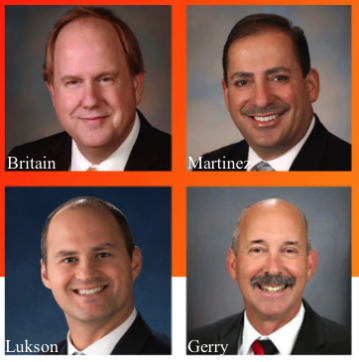
Home » Tri-City mayors dream of returning focus to potholes, parks and police
Tri-City mayors dream of returning focus to potholes, parks and police

July 22, 2020
Tri-City mayors expressed a collective desire to move beyond the Covid-19 pandemic and return to the workaday world of potholes, parks and police budgets during their annual “State of the Cities” address.
The mayors of the four cities delivered their traditional overview of municipal government on July 22. The Tri-City Regional Chamber of Commerce puts on the annual event, typically drawing crowds of 400 to 500 to lunch and learn about municipal initiatives and priorities.
As with most 2020 gatherings, the in-person luncheon gave way to a virtual meetup over Zoom.
Kennewick Mayor Don Britain, Pasco Mayor Saul Martinez, Richland Mayor Ryan Lukson and West Richland Mayor Brent Gerry delivered overviews of key economic development projects, wins, losses and upcoming projects.
Kennewick has new fire stations to build and economic development visions for Vista Field and Southridge, and Pasco will build its long-awaited Lewis Street overpass as soon as BNSF Railway signs off on its plans.
Richland is readying the Duportail Bridge for its debut this fall as it prepares to build a pair of new fire stations. And West Richland brings a new well online this fall that will supply drinking water as it braces for a wave of new residential development.
For the mayors, reopening business is Priority No. 1. The mayors implored residents to wear masks and do what it takes to reduce the spread of coronavirus that causes the deadly Covid-19. To date, 146 residents of Benton and Franklin counties have lost their lives to the disease.
The mayors said it’s too soon to predict what the pandemic will mean for the tax revenue that pays for police services, pavement maintenance, parks and a myriad of other municipal functions.
But they hinted at distress to come.
Richland is looking at a possible 10% decline in property tax revenue, Lukson said.
Pasco expects the pandemic to cause a $4 million hit to its budget in 2020 and again in 2021. West Richland hasn’t quantified the hit, but Gerry predicts declines across all the revenue streams that support the general fund, which in turn pays for police, parks and other municipal services.
“It will be several months before we know the full impact,” Lukson said.
Local News
KEYWORDS august 2020





